You all, look at this!
Doesn’t that look like a real, actual book? The kind of book that you could pre-order from retailers? The kind of book that will one day sit on physical library and book shelves? Well, that’s because it is! A real book! With a real cover with a tasteful mid century serif typeface (is it Pistilli Roman? It’s not not Pistilli Roman)!
You all, I am very excited about this, which I suppose isn’t unexpected. I mean, I get it. There are thousands of books released into the world every year, which means that a single book’s release is much more exciting for an author (and maybe to their mom) than it is for the rest of the world. I totally understand that an author who is excited about their book is a little bit like my six-year-old daughter in the 24 hours after she’s lost a tooth, when she walks up to people, points her smile as far out as possible, and waits for them to say “Wow, did you lose a tooth?”
But darn it, I am the author of the book in question and I’m holding it out to you hoping you’ll ask “Wow, did you write a book?” I’m legitimately proud of this little number, both because of the work I’ve put into it and because I hope that it will actually play a useful role in a whole lot of other people’s lives.
This seems like the kind of occasion that I often commemorate with a few questions and answers, so here we go.
What is this book about?
Well, it’s a memoir, so it’s about my life. It will be, as far as I know, the only book released in 2024 where you can read about the cursed process of trying to pick a Meaningful Swedish Name for our son, the time I accidentally set off the culture wars at a rural New Mexico elementary school by not requiring my fifth graders to say the Pledge of Allegiance, and an extremely beautiful (and profoundly 1999) high school afternoon spent driving around Billings, Montana listening to “Crash Into Me” by The Dave Matthews Band (with my Methodist youth group crush, no less!).
As my teenage niece correctly pointed out to me this summer, though, “wait, it can't be just about your life, though, because you’re, like, not a famous person.”
Good point, teenage niece!
As should come as no surprise, what the book is really about is a life spent negotiating what it means to be White, and more specifically, about defining myself in reaction to and often in opposition to other White people. Obviously, there are incredible books about the ways that Whiteness defines itself oppositionaly towards communities of color (which is, of course, a crucial piece of the puzzle if we’re going to get out of this White supremacy mess). As I look both at my own life and the broader history of Whiteness, though, its clear that the need for White people to strive, compete with and define ourselves as “not being like those white people” has also played a key role in keeping us stuck in neutral on the road towards racial justice.
I honestly don’t feel like White people talk about those circular firing squad fights that we have with each other nearly enough. I mean, I definitely ignored that aspect of the Whiteness story for far too long— I was too busy showing off that I knew all the correct answers to diversity training prompts. That’s why the only truly honest way to initiate a conversation with other White people was to start with myself.
Obviously, my Whiteness is not identical to every other White person’s Whiteness. This book isn’t the story of a generic White human, but a White cis man learning, reinforcing and trying to unlearn patriarchy, a White straight man doing the same with heterosexism, a White guy with two college educated parents doing the same with classism, etc. It is also a biographically specific story: I don’t presume that everybody (or anybody) reading it also started life in rural Montana before moving to suburban Maryland, for example. Some elements of it may seem really resonant to you, while at other moments you’ll be like “Garrett, you have a much more intimate and emotional connection to the town of Doland, South Dakota than I do.” And that’s ok.
My hope, though, is that (for White readers in particular), telling my story of Whiteness will make you feel more welcome to both be curious about and share your own story as well. And while there are definitely selfish reasons why I’m glad this book will soon be out in the world, when I think about all the conversations I’ll get to have with y’all, about your version of The Right Kind of White, well that’s when I start grinning ear-to-ear.
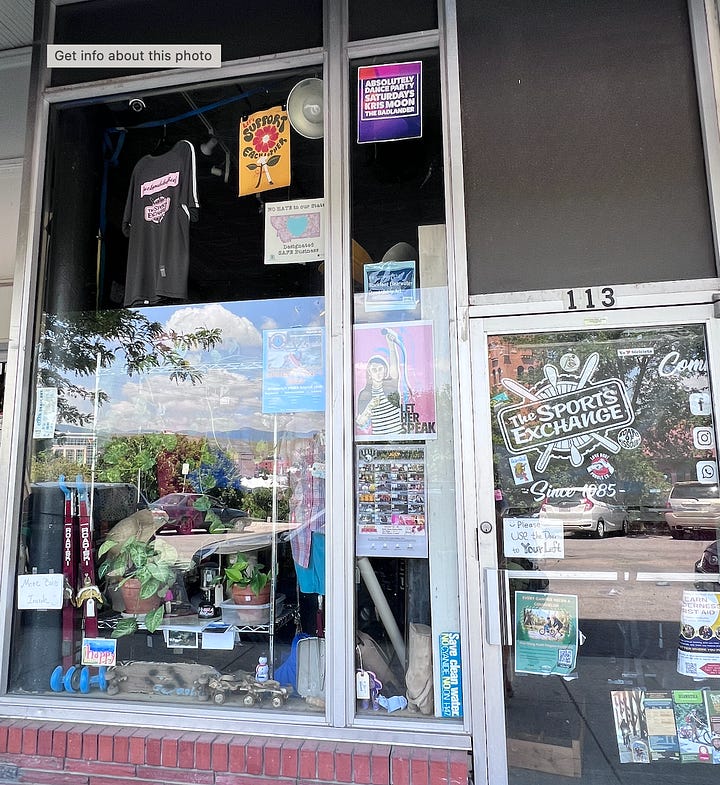
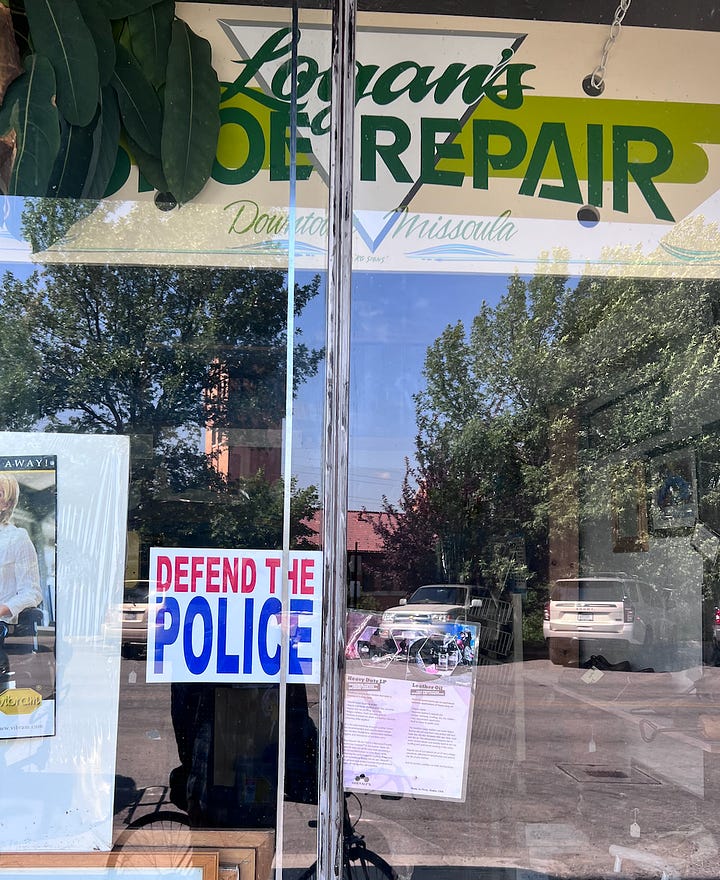
Garrett, this is not my first rodeo. You are likely going to give me a lecture now about how important pre-orders are to a book’s eventual success. So go on, do your pre-order pitch.
Um, thanks! But it’s true! Remember what I said earlier about thousands of books being released in a year? The vast majority of those books (including really incredible books that could contribute to building a better world) will get lost in the shuffle of capitalism and random bad luck. Disproportionally, those books that beat the odds do so because they distinguished themselves early in their life, such that the broader publishing world (bookstores, media outlets, the publisher itself) can’t ignore them. There are exceptions, of course, but for every Braiding Sweetgrass that builds its audience slowly and methodically over time, there are thousands more books that never get that chance. That’s the function of pre-orders— they’re how the publishing industry knows whether to perk its collective ears up to an upcoming release.
Now, does the world need another book by a cis White guy? No, not at all. My particular demographic is as well represented in publishing as we are in the U.S. Senate. But I did my darnedest to write a book that I think is needed in the broader conversation about race and identity and how we move forward beyond our country’s most pernicious ills. See that part above where I talked about inspiring a more robust, honest conversation between White people about our relationship not just to people of color but each other? Well, that only happens if this book doesn’t disappear into the ether.
Wow, sounds like this whole pre-ordering thing is pretty important to you, Garrett. By any chance is it so important that you’re offering fun perks?
You know it, baby! First off, be patient with this, because it’ll be a while before I deliver these gifts, but yes, if you pre-order the book and show me a screenshot to prove it, you get your choice of either (1). a signed bookplate (a fancy word for a large sticker that goes inside the book that enables you to have a signed book even when I physically can’t sign your copy), (2). a one year comped subscription to this newsletter or (3). a limited edition (likely virtual, but mayyyybe physical) Not Very Helpful Travel Guide To The Locations In The Right Kind of White (where else are you going to find out my thoughts on the best three chain restaurants in Richmond, Indiana?).
If any of that is of interest to you, you can do all of your pre-ordering business here:
and then, after you’ve done so, head over here and enter in your information so that I know the best way to show my sincere gratitude:
I notice that when you Garrett (and other writers) tell me they need my support, it’s financial— if I’m not in a position to do so, are there other ways to support?
I mean the fact that you’re reading, sending good vibes, and maybe occasionally sharing a post or two means the world to me. And once the book comes out, you can 100% help out by requesting it from your local public library.
That very official Simon and Schuster webpage says that your book will be released on March 19th, is that true?
I mean, maybe? But probably not. My editor and I are still in revisions, so I expect that date to be moved, but who knows! One thing I’ve learned so far as a debut author is that I understand zero aspects of the publishing process.
Will you be doing anything else fun to promote the book as we get closer?
I hope! Right now I’m focused on finishing it! But yes, wouldn’t it be fun if— at some point in the future— I got to meet you on a book tour or talk to a really interesting TV, radio or podcast host that we both love? Totally. That too is the kind of stuff that is more likely to happen if kind, thoughtful, engaged readers scoop up one of those pre-orders.
Garrett, if you do any public readings, have you already committed to a difficult-to-explain, overly-niche wardrobe choice?
Yes, absolutely. As most people who have had to engage me in conversation in the past two weeks know, I am fully one of those people whose personality is “I recently watched both seasons of The Bear and can’t stop thinking about it” (as an aside: I honestly think Season Two of that show has helped make me a more curious and generous writer). That’s to say, my current plan is to find somebody with good graphic design skills who can make me this shirt…
… except instead of “The Original BEEF Of Chicagoland” it’ll say “The Original BOOK About White People.”
Now, this might be a terrible idea, both because (a). I might be the only one who thinks that’s a funny joke and (b). If I wear that shirt to a reading, it might not immediately be clear that I’m being ironic and that I am in fact aware that other people have written books about White people. All I’m saying is that thinking of a shirt that says “The Original BOOK About White People” cracks me up.
Garrett, could you share a (very partial) list of slightly tangential proper nouns that are currently discussed in this book?
I’ll stop at ten (my apologies to former Baltimore Orioles catcher Mickey Tettleton and oft-sampled Jamaican dancehall singer Sister Nancy, whose sections are not in the current draft).
Butler, Judith: University of California-Berkeley Professor, world renowned philosopher and queer theorist, author of the 1990 book Gender Trouble, a text which I was very impressed with myself for reading as an undergraduate, even though I did not understand any of it.
Camino: Bar and grill in the Walkers Point neighborhood of Milwaukee, WI, as well as the site of an absolute bummer of a 35th birthday happy hour gathering I once had with colleagues; I sincerely recommend the cheese curds.
Chicago Stockyards and International Amphitheatre: Now-defunct but once-sprawling agricultural complex and host venue for the tumultuous 1968 Democratic National Convention, where Hubert Humphrey accepted his party’s Presidential nomination and young protestors were attacked by Mayor Daley’s CPD.
E.T.: The Extraterrestrial: Blockbuster 1982 film about the bond between a young White boy and a benevolent alien.
“If The South Woulda Won:” Country song by Hank Williams Jr. (the artist most famous for inquiring as to whether you are ready for some football); its lyrics document a laundry list of changes that Mr. Williams Jr. imagines would have come to pass had the South won, interestingly he focuses less on the obvious implication of that hypothetical situation and more on cartoonish regional signifiers (“all the fiddles would be made in Virginia”) as well as garden variety boarishness (“all the women would go to Georgia to learn how to talk in a Southern accent and smile in an inviting manner”).
Joint Effort, The: Not-so-subtly named head shop in Missoula, Montana. While I did not patronize that particular establishment (head shops were very much not my scene, man— see “(Our God Is An) Awesome God” below), its presence on a prime chunk of Higgins Avenue real estate gave me a good sense of the kind of town my family had moved to back in 1995.
Ohio River: The 981 mile long Mississippi River tributary that was once infamous as the dividing line between the half of the country where slavery was legal and the half where it was illegal. It is also the setting (specifically the portion of the river that separates Louisville, Kentucky from Jeffersonville, Indiana) for the final scene in the book.
(“Our God Is An) Awesome God” (Christian praise song written by Rich Mullins in 1989; it is impossible to overstate the ubiquity of this song on the 1990s youth group praise circuit and whose lyrics are much more aggressive than I remembered).
Pfeiffer, Michelle (Oscar nominated actor who starred in the 1995 film Dangerous Minds and who also played the iconic role of “Michelle Pfeiffer sitting in a chair and looking tough while Coolio raps at her” in the music video for “Gangsta’s Paradise”).
Rouse, James (Real estate developer and utopian founder of Columbia, MD, a planned community that was supposed to be the future of America and which, at varying points in its history ,was home to Aaron Mcgruder (the creator of The Boondocks), Linda Tripp (prominent figure in the Monica Lewinsky-Bill Clinton saga), Bree Newsome (the anti-racist activist famous for removing the Confederate flag from the South Carolina state house), Edward Norton (actor, grandson of James Rouse) and Dave Sitek (the White guy in TV On The Radio). Oh, and also me.
If you were to share one song that you kept coming back to while writing the book, what would it be?
“Metal Firecracker” by Lucinda Williams
Is that all we need to know about the book now?
Yes! Though I do want to say, while I will share the full story of how this book came to be at some point, suffice to say it would not exist without this newsletter community (and not just in the “thanks for reading” sense, but in the “writing regularly and being in dialogue with you all has helped push me— both emotionally and intellectually— and for that I’m so grateful.
Oh one more thing:
I’ll send either a White Pages or Barnraisers sticker to the first person who emails me (garrett@barnraisersproject.org) with a correct guess to the following question:
The typeface on The White Kind of White book cover is an (I hope subtle) homage to what classic book?
That’s all!
Don’t forget to check out the Barnraisers Project cohorts!




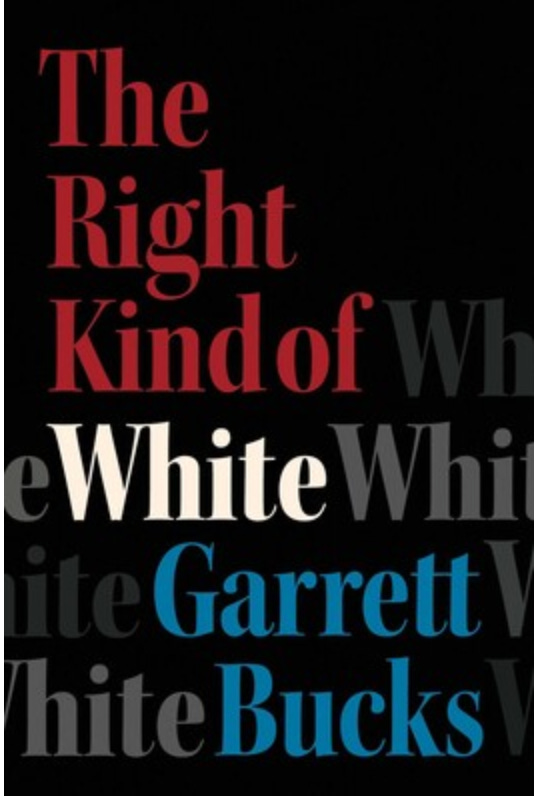
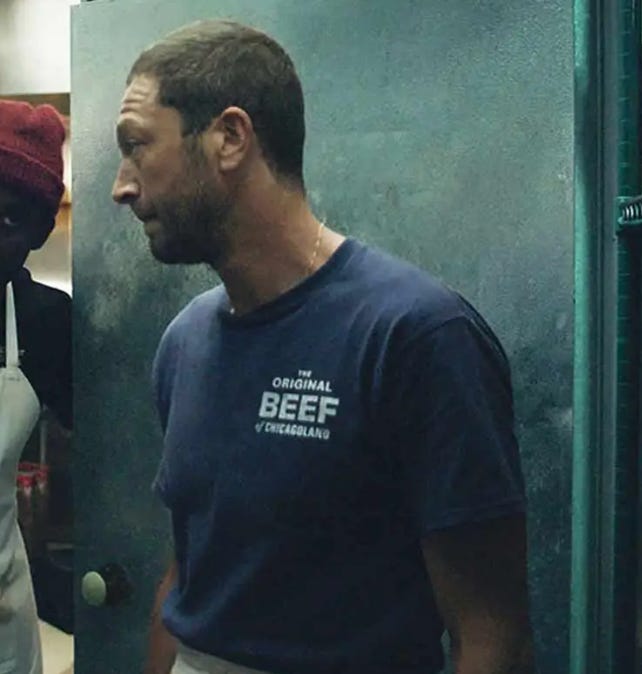
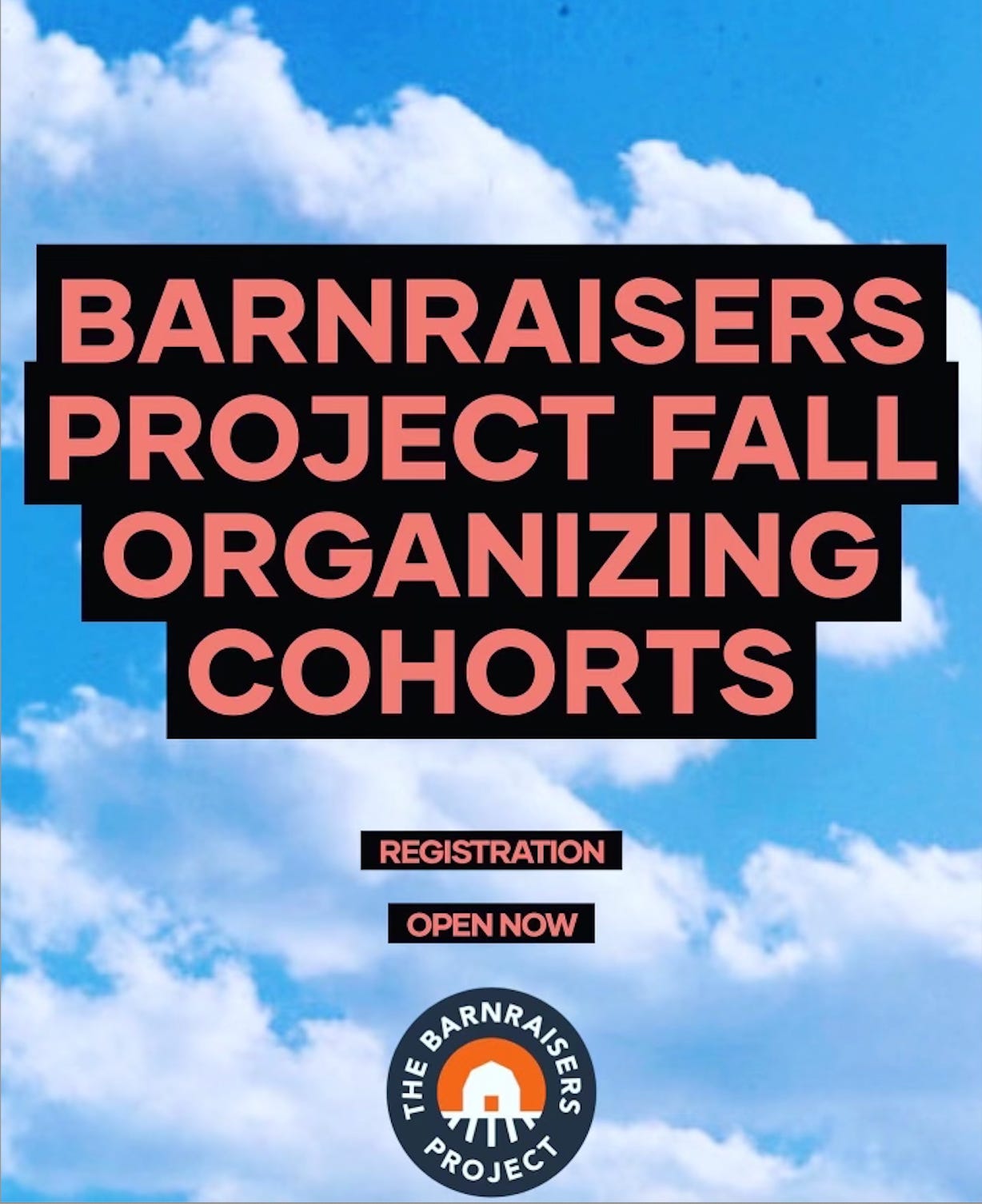
1 - CONGRATULATIONS! I am so excited for you (and also me, to get to read the book, and for more people to get a chance to learn about your generous, funny, insightful writing)
2 - I can totally make that shirt design for you to have made at some kind of shirt establishment if you want.
3 - METAL FIRECRACKER!!! I just spent a perfect evening last week driving around Vancouver with a carful of friends scream-singing our way through the entirety of Car Wheels On A Gravel Road, easily one of the best albums in Music. Were you disappointed Lucinda Williams had already rudely claimed "Don't Tell Anybody the Secrets I Told You" for her own memoir title?
Congrats, Garrett!! Extremely exciting.